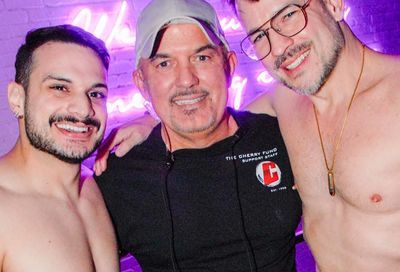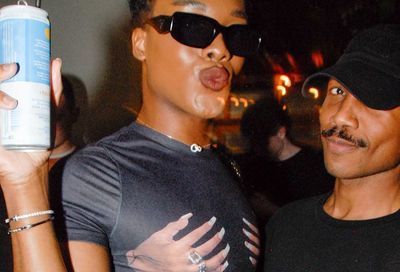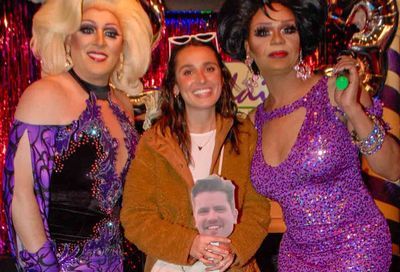D.C. Marriage 101
Commentary: Town Square
Did you know that the District of Columbia now ranks sixth in the nation (as compared with states) in legal protections for same-sex couples? This amazing statistic is due largely to the efforts of the Gay and Lesbian Activists Alliance (GLAA), which has worked quietly with our D.C. Council allies to draft and steer to passage nearly a dozen bills enhancing D.C.’s 1992 domestic partnership law. With a few more enhancements, we will have marriage in all but name.
GLAA has fought for equality since 1971, and we will not be satisfied with anything short of full civil marriage. The question is how to get there. GLAA’s incremental approach has been winning victories for nearly 36 years. We have organized coalitions around issues from domestic partners to condom availability in schools and prisons, educated politicians and the press, built consensus on particular proposals, and drafted legislation. GLAA rates local candidates on marriage and other issues, and publishes their answers on our website at www.glaa.org. In 2004, GLAA released our report, ”Marriage Law in the District of Columbia,” as a necessary basis for further efforts toward equality for gay couples in D.C.
All of this has been done in the shadow of the U.S. Congress, which has a long bipartisan history of treating the district as a colony. This is due to Article I, Section 8 of the U.S. Constitution, which grants Congress ”power … To exercise exclusive legislation … over such district … as may … become the seat of the government of the United States….”
Congress can veto or repeal any law passed by D.C., even though no voting member of Congress is answerable to D.C. voters. Congress also controls D.C.’s annual appropriations bill. Congress vetoed D.C.’s original repeal of our sodomy law in 1981; blocked implementation of our domestic partnership law for nine years until 2002; and continues to bar D.C. from spending its own money on clean needle exchange to prevent HIV. The injustice of all this is beyond galling, but charging ahead without heeding it would be like stepping into an elevator car that isn’t there. GLAA’s alternative is not to go into hiding, but to take sustainable steps forward, as Councilmember David Catania wisely advises.
When GLAA began our marriage advocacy in the 1990s, the gay community was far more divided on the issue than it is today. Gay visibility and advocacy have moved American society an extraordinary distance since then. Those who disparage incrementalism because its results are not instantaneous and complete should consider the remarkable success of what one critic called GLAA’s ”old-school” approach. They should also explain what results they expect from their more radical all-or-nothing approach. And they should give us a vote count of Congress members who favor marriage equality.
GLAA led the coalition behind the district’s original domestic partnership law, and worked with local and national allies, chiefly the Human Rights Campaign, in the next decade to persuade Congress to lift its ban on implementing that law. In 1999 HRC defeated a congressional attempt to ban adoptions by same-sex couples in the district. If D.C. passed a marriage bill now, the blowback on Capitol Hill could derail HRC’s efforts to pass employment non-discrimination and hate crimes legislation and efforts to repeal ”Don’t Ask, Don’t Tell.” It could also adversely affect our neighbors in Maryland, give new impetus to a threatened anti-gay ballot initiative in the district, and cost D.C.’s gay families their existing protections.
When will it be time to push a marriage bill in D.C.? GLAA’s legislative maven, Bob Summersgill, suggests prerequisites like these:
- The Davis-Norton bill granting D.C. a full vote in the House. This will still leave us unrepresented in the Senate, but will give us far more leverage than we have now.
- Passage of budget autonomy, so that D.C.’s locally-funded budget is not subject to undemocratic congressional amendments.
- Passage of legislative autonomy, so that D.C.’s locally-passed laws are not subject to routine congressional review before taking effect.
- Once several states (say six) have adopted same-sex marriage, Congress’s meddling impulse might be tempered if D.C. follows (rather than leads) the trend.
The point is not to wait until there is no risk, but until we have a fighting chance. If you are outraged at the second-class status of gay families, please work with GLAA, Congresswoman Eleanor Holmes Norton and allies like D.C. Vote to win the next battles. Instead of looking for shortcuts or fighting one another, let’s press ahead smartly together.
Richard J. Rosendall is a past president of the Gay and Lesbian Activists Alliance of Washington, D.C. He can be reached at rrosendall@starpower.net.
Support Metro Weekly’s Journalism
These are challenging times for news organizations. And yet it’s crucial we stay active and provide vital resources and information to both our local readers and the world. So won’t you please take a moment and consider supporting Metro Weekly with a membership? For as little as $5 a month, you can help ensure Metro Weekly magazine and MetroWeekly.com remain free, viable resources as we provide the best, most diverse, culturally-resonant LGBTQ coverage in both the D.C. region and around the world. Memberships come with exclusive perks and discounts, your own personal digital delivery of each week’s magazine (and an archive), access to our Member's Lounge when it launches this fall, and exclusive members-only items like Metro Weekly Membership Mugs and Tote Bags! Check out all our membership levels here and please join us today!



















